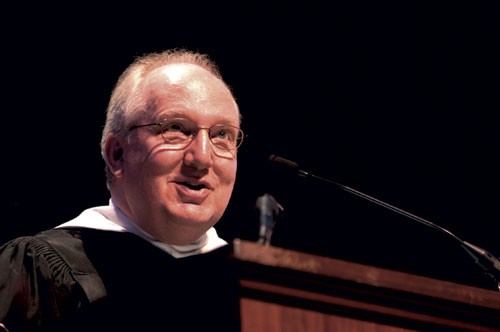
Blocker surprises SMU with resignation (Photo by John Schreiber, The Daily Campus)
Provost Robert Blocker surprised university officials with his resignation Monday from the office of the provost and vice president of academic affairs. Blocker’s final day is May 31. He will then return to his previous position at Yale as the dean of the School of Music.
“I was surprised and disappointed that we will not have the opportunity to work together,” President R. Gerald Turner said. “In hindsight, there were signs that it has been stressful for him.”
In a statement sent to all students and administrators via e-mail, Blocker said he “found it increasingly more difficult to attain the expectations I have for myself both as your academic leader and as a pianist with international and recording engagements.”
He said that his interests in administrative work were centered in the music and the arts.
Turner said he had many conversations over the weekend with Blocker about leaving, and Blocker said he didn’t want to deal with the administrative problems associated with the provost’s job.
In Blocker’s previous position at Yale, he was allowed to take periods of time off to work on his musical studies and perform. The job at SMU did not allow such freedom.
Blocker explained his dedication to music, saying, “This is not a simple matter of performing at a high level; rather, it is the essence of my soul.”
Associate Provost Thomas Tunks said he applauded Blocker’s integrity in coming to the realization that the provost’s job was taking too much time away from music and resigning his position.
“It’s better to make the decision now, rather than later, because it eventually would have affected his job and his performance,” Tunks said.
Vice President of Student Affairs Jim Caswell called the move “very unusual, but very believable.”
“I don’t think he anticipated the amount of stress that came with being that involved,” Caswell said.
Blocker was picked in March 2005 to be Ross C. Murfin’s replacement. He arrived on campus July 15, 2005, and will have been provost for less than a year by the time he leaves.
Turner said an interim provost will be named by the end of the week, and that he wants to have a search committee named by the time of graduation activities. The search for a new provost will begin when classes resume in the fall.
“All of the success we’ve had at SMU should encourage anybody to consider applying,” Turner said.
A search for a new dean for the Dedman College will also be running at the same time as the provost search.
Turner stressed that the change in administrators should not be viewed as a concern, but rather as natural turnover at an academic institution.
Different university initiatives are now in various states. The work on the Centennial Campaign, which Blocker was heavily involved in, will continue without him. Turner said the next provost will be brought on board with the campaign as soon as he or she is hired.
The revision to the General Education Curriculum, which was a large part of the 2005 provost search and Blocker’s term in office, will be put on hold temporarily.
Tunks said the work of the university will continue despite Blocker’s resignation, and “a university of our size will be able to absorb a change of this nature.”
Blocker returns to work at Yale on July 1.
Yale President Richard Levin praised Blocker’s return, saying, “Robert was an extraordinary dean who had brought the School of Music to the highest level of prestige.”
Yale had a failed search to find a replacement for Blocker and used an interim dean to fill his position for the 2005-06 school year, which allowed Blocker to return to his old job.
“As we searched for a new dean, we were seeking someone of Robert’s vision, talent, energy and accomplishment. We have surpassed that goal by welcoming Robert back to the school he led so ably,” Levin said.








